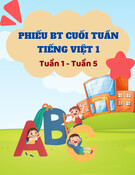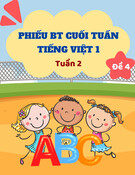
REVISION FOR ONE-PERIOD TEST 1
I. Choose the word which has the underlined part pronounced differently from the rest.
C©u 1:
A. women B. respect C. parents D. determine
C©u 2:
A. concerned B. developed C. raised D. maintained
C©u 3:
A. majority B. traditional C. American D. manage
C©u 4:
A. called B. photographed C. smoked D. based
C©u 5:
A. shares B. looks C. beliefs D. attempts
II. Choose the word which is tressed differently from the rest
C©u 6:A. across B. common C. simply D. brother
C©u 7:A. prolem B. dinner C. suppose D. minute
C©u 8:A. waiter B. toward C. teacher D. slightly
III. Choose the best answer.
C©u 9 : What an attractive hair style you have got, Mary ! _...................
A. Thank you for your compliment B. Thanh you very much. I am afraid
C. You are telling a lie D. I don’t like your saying
C©u 10: When John...............last night, I...............my favourite show on TV.
A. called/ was watching B. called/ have watched
C. was calling/ watched D. had called/ watched
C©u 11 : Sometimes I do not feel like.............to my sibling about my troubles.
A. talk B. to talk C. talking D. talked
C©u 12 : You are old enough to take..................for what you have done.
A. irresponsible B. responsibility C. responsibly D. responsible
C©u 13 : By this time next summer, you............your studies
A. complete B. will have
completed C. will complete D. are completing
C©u 14 : Last night at this time, they ..........the same thing. She..............and he........the newspaper.
A. were doing/ was cooking/ was reading B. had done/ was cooking/ read
C. are doing/ is cooking/ is reading D. was doing/ has cooked/ is reading
C©u 15 : You look great in this new dress. _.............
A. Not at all B. With pleasure
C. Do not say anything about it D. I am glad you like it
C©u 16 : Whenever problems come up, we discuss them frankly and solution quickly.
A. happen B. encounter C. arrive D. clean
C©u 17 : John asked me..............that film the night before.
A. that I saw B. If I had seen C. If had I seen D. had I seen
C©u 18 : Robert said that his father................to London the year before.
A. goes B. has gone C. had gone D. went
C©u 19 : The boy waved his hands to his mother, who was standing at the school gate, to...............her
attention.
A. follow B. pull C. attract D. tempt
C©u 20 : In the 19th century, it............two or three months to cross North America by covered wagon.
A. have taken B. had taken C. was taking D. took
C©u 21 : She got up late and rushed to the bus stop.
A. went quickly B. went leisurely C. came into D. dropped by
C©u 22 : My mother always the first..............up and the last.........to bed.
A. getting/ going B. to get/ going C. getting/ to go D. to get/ to go
C©u 23 : Tam is willing to help his mother with the household................
A. jobs B. chores C. choir D. chord
C©u 24 : She told the boys..................on the grass.
1

A. not playing B. do not play C. did not play D. not to play
C©u 25 : When Peter............., I...........him to your new house.
A. had arrived/ had taken B. arrives/ will take
C. has arrived/ am taking D. will/ take
C©u 26 : Most doctors and nurses have to work on a..............once or twice a week at the hospital.
A. household chores B. night shift C. special dishes D. solution
C©u 27 : I have not met her for three years.
A. During three years, I met her once. B. I did not meet her three years ago.
C. The last time I met her was three years ago. D. It is three years when I will met her.
C©u 28 : He has been very interested in doing research on..............since he was at high school.
A. biology B. biologically C. biologist D. biological
C©u 29 : By the time we...........to the station, Susan had been waitng for us for more than two hours.
A. have got B. will get C. get D. got
C©u 30 : Body language is a potent form of.............communication.
A. oral B. non-verbal C. verbal D. tongue
IV. Choose the word or phrase that is not correct.
C©u 31 : Everybody in our family have to do the share of the household chores.
A B C D
C©u 32 : We often give gifts in a friend’s or relative’s birthday.
A B C D
C©u 33 : In Vietnam, two or three generations lives under one roof.
A B C D
C©u 34 : My brother is always willing to give hand with doing the gardening.
A B C D
C©u 35 : In Asia, a husband is obliged telling his wife he has been.
A B C D
V. Read the passage again then choose the correct answer to answer the following questions by marking the
corresponding letter: A, B, C, or D.
Communication in general is process of sending and receiving messages that enables humans to share knowledge,
attitudes, and skills. Although we usually identify communication with speech, communication is composed of two
dimensions: verbal and non-verbal.
Non-verbal communication has been defined as communication without words. It includes apparent behaviors such
as facial expressions, eyes, touching, tone of voice, as well as less obvious messages such as dress, posture and spatial
distance between two or more people.
Activity or inactivity, words or silence all have message value: they influence others and these others, in turn,
respond to these communications and thus they are communicating.
Commonly, non-verbal communication is learned shortly after birth and practiced and refined throughout a person's
lifetime. Children first learn non-verbal expressions by watching and imitating, much as they learn verbal skills.
Young children know far more than they can verbalize and are generally more adept at reading non-verbal cues than
adults are because of their limited verbal skills and their recent reliance on the non-verbal to communicate. As children
develop verbal skills, non-verbal channels of communication do not cease to exist although they become entwined in the
total communication process.
C©u 36: The word reading has a close meaning to ________.
A. looking at the words that are written B. understanding
C. saying something aloud D. expressing
C©u 37: Which is not included in non-verbal communication?
A. spatial distance B. tone of voice C. words D. facial expressions
C©u 38: According to the writer, ________.
A. One cannot communicate in both verbal and non-verbal language.
B. People communicate with both verbal and non-verbal language.
C. Those who can listen and talk should not use non-verbal language.
D. Non-verbal language is only used by the deaf and the mute.
C©u 39: Human beings ________.
A. have learnt how to communicate in non-verbal language through books
2

B. can communicate in non-verbal language only when they are mature
C. have learnt how to communicate in non-verbal language since a child
D. communicate in non-verbal language much less than they do in verbal language
C©u 40: We can learn from the text that ________.
A. most people do not like non-verbal communication
B. even silence has message value
C. non-verbal can never get any responses
D. touching is not accepted in communicating--------------------------------------
3



![Tài liệu tham khảo Tiếng Anh lớp 8 [mới nhất/hay nhất/chuẩn nhất]](https://cdn.tailieu.vn/images/document/thumbnail/2025/20250806/anhvan.knndl.htc@gmail.com/135x160/54311754535084.jpg)










![Phiếu bài tập cuối tuần Tiếng Việt 1 tuần 2 đề 2: [Hướng dẫn chi tiết]](https://cdn.tailieu.vn/images/document/thumbnail/2025/20250728/thanhha01/135x160/42951755577464.jpg)

